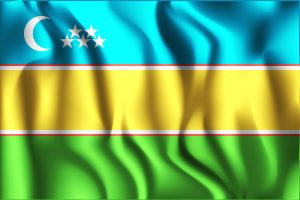Karakalpak activist Aqylbek Muratbai has reportedly been granted asylum seeker status in Kazakhstan, where he is presently in detention at the request of authorities in neighboring Uzbekistan.
Earlier reports, citing family and lawyers, claim that Muratbai has been charged in Uzbekistan with public calls for mass disorder and violence (Article 244 part 2 of the Criminal Code of Uzbekistan) and production or demonstration of materials containing a threat to public safety (Article 244-1 part 3).
A lawyer cited by RFE/RL’s Kazakh Service said that Uzbek authorities considered a memorial event held 500 days after the July 2022 events in Nukus – in which Karakalpak activists urged people to turn off their lights for 16 minutes, the number of years in prison that Karakalpak lawyer and journalist Dauletmurat Tazhimuratov was sentenced to by an Uzbek court – a “public call for mass unrest and violence.” The second charge, the lawyer said, related to the publication of a video of Koshkarbai Toremuratov, another Karakalpak activist in Kazakhstan, delivering a speech at the October 2023 Warsaw Human Dimension Conference, a major human rights conference convened annually by the OSCE.
Although Muratbai holds an Uzbek passport, he has lived in Kazakhstan since 2013. He was detained the night of February 15. On February 19, a court in Almaty, Kazakhstan’s largest city, ordered him held in custody for 40 days (that is, until March 30), while Astana decides whether to fulfill an extradition request.
Muratbai’s sister, Fariza Narbekova, told RFE/RL’s Kazakh Service this week the activist has been given an asylum seeker’s certificate by the Almaty Department of Coordination of Employment and Social Programs. While valid, the certificate ought to prevent his extradition. The RFE/RL report stated that the certificate is valid until May 23, 2024 and that it could be extended for another three months.
As I wrote earlier this month:
Muratbai has become a significant voice for the Karakalpak people in the nearly two years since violence broke out in Nukus, the capital of the Republic of Karakalpakstan, in July 2022 after Tashkent had proposed a constitutional change that would have eliminated the autonomous republic’s sovereignty. While Uzbekistan quickly walked the proposed changes back, Tashkent has spared no effort in pursuing serious charges against those who opposed the proposal. More than 60 civilians have been charged in Uzbekistan in connection with the 2022 Karakalpakstan protests, most of them in a pair of trials of January and March 2023.
But the Uzbek authorities have looked beyond the borders of Uzbekistan and Karakalpakstan for targets, including two trials in absentia of Aman Sagidullayev and Nietbay Urazbayev in May 2023. Sagidullayev has political asylum in Norway, but Urazbayev lived in Kazakhstan. Even though he had obtained Kazakh citizenship, Urazbayev told The Diplomat last year that he was nevertheless worried that the Uzbek authorities would find some way to get him. Urazbayev died in Almaty in early January 2024, a month after being notified that he was being stripped of his Kazakh citizenship.
Between September and November 2022, Kazakh authorities had detained at least five Karakalpak activists in Kazakhstan – Ziuar Mirmanbetova, Koshkarbai Toremuratov, Zhangeldi Dzhaksymbetov, Raisa Kudaibergenova, and Tleubike Yuldasheva – all of whom where Uzbek citizens. Ultimately, none was extradited and all five were released after a full year in detention.
As of November 2023, four of the five Karakalpak activists had their refugee applications rejected.
While Muratbai’s asylum seeker certificate may, technically, lead to the granting of refugee status, in practice Kazakhstan rarely grants such status.
In November 2023, a report by Elisabeth Briand for openDemocracy outlined the uphill battle asylum seekers face in Kazakhstan:
Only 327 foreign citizens currently have refugee status in Kazakhstan, according to data from the Ministry of Labour and Social Protection. The vast majority – 255 – are from Afghanistan, 59 are from Ukraine, six are from China, six are from Syria, and one is from Uzbekistan. To date, 514 additional people have received an asylum-seeker certificate.
Generally Kazakhstan does not expel refugees back to their home countries, as it would violate the 1951 Refugee Convention. They are left to either seek asylum in another country or to live on the margins: without an official status, meaning they cannot access public healthcare or obtain a legal job, and live in a constant fear of expulsion.
At present, Muratbai’s extradition is temporarily blocked by the asylum seeker certificate. Whether he will be released after 40 days is uncertain. The other Karakalpak activists detained in Kazakhstan, as noted above, were held in custody for a full year before being released. Then their refugee applications were denied.































